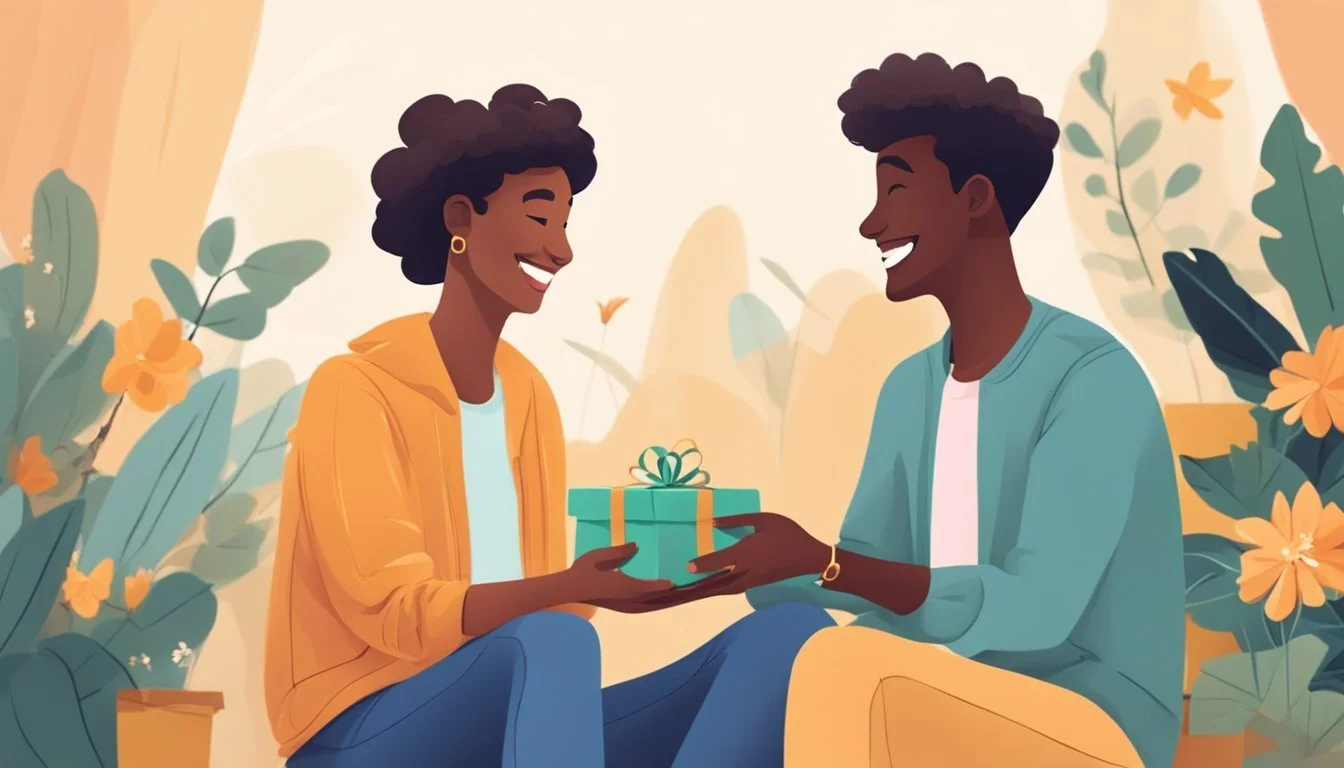16 Ways to Keep the Friendship Alive in Your Romantic Partnership
Practical Tips for Lasting Bonds
Maintaining a strong friendship within a romantic relationship is essential for long-term happiness and mutual support. By fostering a deep and resilient bond of friendship, couples can enhance their overall connection, making their relationship more enjoyable and fulfilling. In this article, we will explore various ways to integrate friendship into the fabric of your romantic partnership.
Couples who prioritize friendship often report higher satisfaction and a stronger sense of partnership. This approach not only strengthens the emotional connection but also helps navigate the ups and downs of life together.
1) Prioritize Communication
Clear and open communication is crucial in maintaining the friendship aspect of a romantic relationship. Regularly sharing thoughts, feelings, and concerns helps both partners stay connected and understand each other better.
Listening actively is just as important as speaking. This means focusing on what your partner is saying without interrupting or thinking about your response.
Setting aside time each day for meaningful conversations can strengthen the bond. Whether it's during dinner or before bed, these moments foster closeness and trust.
Addressing conflicts calmly is vital. Discuss issues as they arise rather than letting them fester. This prevents misunderstandings from growing into bigger problems.
Showing empathy during discussions ensures that both partners feel heard and validated. This builds emotional intimacy and mutual respect.
Expressing gratitude and appreciation regularly also plays a key role. Letting your partner know what you value about them reinforces positive feelings and reinforces the friendship.
2) Scheduled Date Nights
Scheduled date nights can significantly enhance the quality of a romantic partnership. Setting aside specific times for dates helps ensure that couples consistently make time for each other, no matter how busy life gets.
Regular date nights allow partners to reconnect and focus solely on each other. This intentional time together can strengthen their bond and keep the relationship feeling fresh and exciting.
By planning date nights in advance, couples can anticipate the time they'll spend together. This can create a sense of excitement and build positive anticipation, fostering a deeper emotional connection.
Trying new activities or visiting different places during scheduled date nights can keep the experience engaging. For example, going to a new restaurant or exploring a new hobby together can bring a sense of novelty and adventure.
Personal interests and preferences should guide the choice of activities. Partners can tailor their date nights to suit their unique tastes and needs, whether it’s a quiet dinner, a movie night, or a more adventurous outing.
Scheduled date nights provide a routine that supports the continual growth of the relationship. Consistency in spending quality time together helps partners maintain a close, intimate connection.
For more ideas on planning date nights, consider visiting various resources.
3) Learn Each Other’s Love Language
Understanding each other's love language can significantly enhance the connection in a romantic partnership. Dr. Gary Chapman, in his book "The Five Love Languages," identifies five primary ways people express and receive love: Words of Affirmation, Acts of Service, Receiving Gifts, Quality Time, and Physical Touch.
Knowing your partner’s preferred way of expressing love helps in meaningful communication. For instance, if a partner values Words of Affirmation, simple appreciative words can make a significant impact on them. Conversely, if they cherish Quality Time, dedicating undivided attention matters more than verbal praises.
Acts of Service, like doing household chores or running errands, can be a powerful way to show love to someone who values practical support. For those who appreciate Receiving Gifts, thoughtful presents, no matter how small, can make them feel cherished.
Physical Touch, such as hugs or holding hands, can be a profound connector for those whose love language is touch. Recognizing these preferences ensures that affectionate gestures hit the mark and strengthen the bond in the relationship.
Taking quizzes or reading resources on Strengthening Friendships and Love Languages can provide insights into discovering each other’s love languages. Understanding and speaking each other’s love language can lead to fewer misunderstandings and more fulfilling interactions.
4) Share Hobbies Together
Sharing hobbies is a great way for couples to connect on a deeper level. It allows them to spend quality time together while enjoying activities they both appreciate.
Gardening can be an excellent choice. Creating a butterfly garden is not only enjoyable but beneficial for the environment. Planting flowers like asters, milkweed, and zinnias invites colorful visitors to your garden.
Another option is practicing yoga together. This activity improves flexibility, strength, and balance. Couples can attend classes or use online videos at home, making it a versatile and accessible way to relax and connect.
Stargazing offers a serene and intimate experience. By simply laying out a blanket and observing the night sky, couples can engage in deep conversations and enjoy the tranquility of the moment. This hobby fosters a sense of wonder and closeness.
Exploring new hobbies together, such as cooking or hiking, can also be rewarding. Cooking together allows couples to experiment with new recipes and share the joy of creating meals. Hiking provides an opportunity to explore nature and enjoy physical activity together.
The key to maintaining the bond in a romantic partnership is finding shared interests. When couples engage in activities they both enjoy, it not only strengthens their connection but also creates lasting memories.
5) Travel and Explore New Places
Traveling together can significantly enhance the bond in a romantic relationship. Experiencing new destinations allows couples to create lasting memories and shared adventures.
Exploring unfamiliar places can introduce new cultures and cuisines. This not only makes the trip exciting but also encourages learning and growth together. A visit to a local market or a food festival can be a delightful adventure.
Traveling often involves planning and navigating challenges. These tasks require teamwork and communication, which are essential for strengthening the relationship. Deciding on a destination, organizing travel itineraries, and tackling unexpected issues together can build trust and reliance.
Even short trips, like weekend getaways or day trips, can have a positive impact. They offer a break from routine and provide an opportunity to reconnect. Scenic drives, hiking trails, or beach trips can be refreshing and romantic.
Collecting mementos from trips can help keep the memories alive. Items like photos, souvenirs, or a recipe for a favorite dish can serve as reminders of the time spent together. These keepsakes can bring joy and nostalgia long after the trip is over.
For more ideas on how to make travel a romantic experience, check out this guide to traveling and keeping the spark alive.
6) Compliment Each Other Daily
Regular compliments can greatly enhance a romantic partnership. By acknowledging each other's efforts and positive qualities, partners can foster a deeper connection.
Compliments don’t have to be grand gestures. Simple acknowledgements like appreciating a partner's sense of humor or remarking on their appearance can go a long way.
Verbal affirmations are not the only way to give compliments. Non-verbal cues like a warm smile or a reassuring touch can also convey appreciation and admiration effectively.
Make it a habit to express gratitude for the small things. Acknowledging daily contributions and efforts keeps the sense of appreciation alive.
Using specific and genuine compliments strengthens the impact. Instead of vague praises, highlight particular actions or traits that made a difference. This not only boosts the partner’s confidence but also reinforces positive behavior.
Compliments should be sincere and heartfelt. Partners can intuitively sense authenticity, and sincere compliments build a stronger emotional bond.
Practicing these small, daily acts of appreciation can significantly enhance mutual respect and love in the relationship. The consistency of positive affirmations helps maintain the emotional connection, ensuring that the spark in the relationship remains bright.
7) Surprise Each Other
Small surprises can reignite the spark in a relationship. Thoughtful gestures show your partner that you care and think of them often.
A sweet note on a steering wheel or a date night invitation in a coffee cup can make their day. These small acts of kindness foster appreciation and excitement.
Creative surprises don’t have to be expensive. A $20 bill hidden in a coat pocket or a simple home-cooked meal can convey your love.
Surprises bring an element of playfulness into the relationship. They remind partners to cherish the little moments together.
Planning a surprise outing or leaving a heartfelt message can break the monotony. These actions help maintain a sense of wonder in the relationship.
Consider each other's preferences when planning surprises. This ensures that the gesture is meaningful and appreciated.
Surprises can be as simple as a walk together or sharing a favorite dessert. Keeping it personal makes all the difference.
8) Support Personal Goals
Supporting each other’s personal goals is crucial in maintaining a strong friendship within a romantic partnership. Celebrating each other's achievements, even the small ones, can foster a sense of mutual respect and admiration. This practice creates a supportive atmosphere where both partners feel valued and understood.
Encouragement matters. When one partner expresses an ambition or goal, the other can offer words of support and belief in their abilities. Positive reinforcement helps to build confidence and determination.
Additionally, offering practical help, such as sharing resources or providing time for their partner to work on their goals, shows a deep level of commitment and care for each other's personal growth.
Respecting each other’s time and providing space for individual pursuits reflects a healthy, balanced relationship. By understanding and valuing personal dreams, partners can keep nurturing the friendship within their romance.
Acts of support can range from attending important events together to simply asking about progress and showing genuine interest. This behavior strengthens trust and builds a robust foundation for both the friendship and the romantic aspects of the relationship. For more insights, consider reading 7 Rules of Friendship Can Improve Your Romantic Relationship.
9) Laugh Together Often
Laughter plays a crucial role in maintaining a joyful and resilient romantic partnership. It is a way to bond, relieve stress, and bring lightness to any situation. Couples who laugh together often find it easier to navigate life's challenges.
Sharing jokes, watching comedies, or recalling funny memories can create moments of shared happiness. Even small instances of humor can help partners feel closer and more connected.
Laughter also helps to diffuse tension during conflicts. Humor, when used appropriately, can alleviate the intensity of disagreements and foster a more constructive dialogue.
Studies suggest that laughter releases endorphins, which are natural mood elevators. This contributes to an overall sense of well-being and satisfaction in the relationship.
Taking the time to laugh together helps to keep the friendship aspect of the relationship alive. It reminds partners of the joy they first found in each other's company and strengthens their emotional bond.
10) Handle Conflicts Maturely
Conflicts are inevitable in any relationship, including romantic partnerships. Addressing disputes with maturity can strengthen the bond rather than weaken it.
Effective communication is key. When discussing an issue, both partners should use "I" statements instead of "you" statements to avoid sounding accusatory. For example, say "I felt hurt when..." instead of "You hurt me when..."
Listening is just as important as speaking. Partners should give each other their full attention and respond thoughtfully. This means avoiding interruptions and really hearing what the other person is saying.
It's also crucial to avoid bringing up past grievances during a conflict. Focusing on the current issue helps in finding a constructive resolution.
Taking a time-out can be beneficial if emotions run too high. Sometimes a short break allows both partners to calm down and approach the problem with a clear mind.
Using concrete examples instead of being vague aids in addressing specific concerns. For instance, if one partner feels neglected, specifying times or instances can clarify the issue.
Mutual respect is non-negotiable. Treating each other with kindness, even during disagreements, creates an environment where issues can be resolved more easily.
For more strategies on handling conflicts, you can refer to Wondermind.
11) Show Appreciation Regularly
Expressing gratitude daily strengthens bonds in a romantic partnership. Small gestures, such as thanking your partner for everyday tasks or acknowledging their support, can go a long way.
Couples benefit from setting aside moments to verbally express appreciation. This can include praising qualities you admire or recognizing efforts they've made.
Simple, genuine compliments also play a crucial role. Acknowledging your partner’s strengths and efforts makes them feel valued and respected.
Consider incorporating actions that show appreciation. Personal gestures, such as leaving a note or planning a surprise, create a sense of mutual gratitude and respect.
Practicing active listening to understand and appreciate your partner’s perspective further enhances the connection. This fosters a deeper emotional bond and ensures both partners feel heard and valued.
For more ideas on maintaining the spark in your relationship, check out these romantic gestures and ways to keep the romance alive.
In friendships, expressing appreciation has proven to be an effective strategy, demonstrating its importance in all types of relationships. For a deeper dive into maintaining friendships, visit this guide.
12) Create Rituals or Traditions
Creating rituals or traditions can deepen the bond in a romantic partnership. They provide a sense of stability and a shared past, making it easier to navigate life's ups and downs.
Simple gestures, like a weekly date night, can make a big difference. Whether it's a cozy night in or exploring a new restaurant, these moments provide a regular opportunity to reconnect.
For couples who travel, consider planning an annual trip together. This allows you to create shared memories and look forward to each new adventure.
Even small daily rituals, like morning coffee together, can foster intimacy. These regular interactions help keep communication open and maintain a sense of closeness.
For more in-depth ideas, you can create traditions around holidays or special occasions. Celebrating anniversaries with unique activities or gifts personalized to your relationship can enhance your connection.
Be adaptable with your traditions. As life evolves, so might your rituals. Embrace changes and find new ways to celebrate your bond, keeping your relationship dynamic and engaging.
For those looking for ideas, you might draw inspiration from Friendship Rituals: Creating Meaningful Traditions with Your Friends. It offers practical advice on fostering connections.
13) Discuss Your Future Together
Talking about the future solidifies the bond in a romantic relationship. It shows commitment and aligns both partners' goals. This can include discussing career aspirations, family planning, or personal goals they wish to achieve together.
Planning trips or activities creates shared experiences to look forward to. It deepens emotional intimacy as both partners dream and plan together.
Bringing up financial goals and management strategies ensures transparency. It helps build trust and minimizes conflicts. They can discuss saving for a house, budgeting for their lifestyle, or planning for retirement.
Regularly revisiting these discussions keeps both partners updated on any changes or new goals. It maintains a cohesive vision for their future.
14) Stay Physically Affectionate
Staying physically affectionate plays a key role in maintaining the intimacy between romantic partners. Simple gestures like holding hands, hugging, and touching can help reinforce emotional bonds and convey love and support.
Physical touch can release oxytocin, often referred to as the "love hormone". This enhances feelings of attachment and comfort, which are essential in a romantic relationship.
Regularly scheduling moments for affection, such as cuddling on the couch or sharing a kiss, can help keep the connection strong. Little physical acts of love go a long way in nurturing the relationship.
Being mindful of each other’s comfort levels is important. Communicate openly about what types of physical affection are most meaningful and ensure that both partners feel respected and cherished. This fosters mutual satisfaction and trust.
15) Give Each Other Space
It's crucial to respect each other's need for personal space to maintain a healthy relationship. When one partner expresses the need for space, it doesn't necessarily indicate problems in the relationship. Instead, it can be a way to recharge and maintain personal well-being.
Engaging in solo activities or hobbies can provide the necessary space. Activities like taking walks alone, running errands separately, or enjoying personal hobbies can create that needed distance. These moments apart can make shared time more valuable.
Communicating about the need for space helps ensure that both partners are comfortable. Regular discussions about feelings and boundaries prevent misunderstandings. A healthy balance of togetherness and personal space can strengthen the bond in a romantic partnership.
When living together, it becomes even more essential to consciously create space for each other. Giving space shows respect for each other's individuality and fosters a sense of mutual trust and freedom. Maintaining this balance is an art that contributes to a thriving relationship.
16) Stay Curious About Each Other
Staying curious about each other helps maintain a fresh and engaging connection. Ask open-ended questions to understand thoughts and feelings. This practice strengthens emotional intimacy and ensures both partners feel valued.
Explore new interests together. Trying new activities can unveil surprising talents and preferences, encouraging deeper appreciation.
Remember to listen actively. Showing genuine interest in your partner’s experiences fosters mutual respect and understanding. This active engagement in their life promotes a continuous learning journey about each other.
By staying curious, boredom and complacency can be avoided. It promotes a vibrant, evolving relationship where both partners feel continually invested.
Understanding the Importance of Friendship in Romance
Friendship in a romantic relationship is crucial for building trust, fostering deep emotional connections, and providing psychological benefits. These elements contribute to the strength and resilience of the relationship.
The Foundation of Strong Relationships
The basis of any meaningful romantic relationship lies in friendship. When partners view each other as friends, they naturally extend kindness, support, and empathy. This foundational aspect encourages open communication and mutual respect, making it easier to navigate conflicts and misunderstandings.
Friendship also promotes shared experiences and interests. Engaging in activities together, such as hobbies or even simple routines, reinforces the connection between partners. This shared time can be crucial in maintaining the bond during challenging periods.
By maintaining a base of friendship, couples can ensure that they have a strong, supportive framework. This framework is vital for lifelong companionship and mutual growth. Partners who are friends first often enjoy a deeper level of trust and commitment.
Emotional and Psychological Benefits
Friendship within a romantic relationship brings significant emotional and psychological advantages. It creates a safe space for partners to express their vulnerabilities without fear of judgment. This level of comfort is essential for emotional intimacy and strengthens the overall bond.
Trust: Friendship enhances trust as partners feel more secure in their relationship. They know they can rely on each other in times of need.
Support: Emotional support from a partner who is also a friend can be more impactful because it combines the love of a romantic relationship with the understanding of a close friendship.
Mental Health: Partnerships anchored in friendship often contribute to better mental health. The constant availability of a confidant helps reduce stress and anxiety.
Friendship's emotional benefits cannot be understated, as they play a key role in sustaining long-term happiness and stability in romantic relationships.
Communication Strategies
Effective communication is the foundation of a strong romantic partnership. It involves both listening actively and understanding non-verbal signals to ensure both partners feel heard and valued.
Active Listening Techniques
Active listening requires one to be fully present and engaged during conversations. It involves turning off distractions, such as phones or televisions. When one partner speaks, the other should maintain eye contact, nod occasionally, and use verbal affirmations like "I see" or "Go on" to show engagement.
Reflecting back what was heard can confirm understanding. For example, rephrasing the partner's words or summarizing their main points can be beneficial. Asking open-ended questions can also deepen the conversation, making the other partner feel valued and understood.
It's crucial to avoid interrupting and to let the speaker finish their thoughts. Practicing patience and showing empathy during conversations can significantly enhance mutual understanding and respect.
Non-Verbal Communication Cues
Non-verbal communication includes all the silent signals sent through body language, facial expressions, and physical gestures. Leaning in slightly can show interest, while maintaining an open posture without crossed arms can signal availability and openness.
Facial expressions are also critical. A simple smile or a concerned look can convey empathy, affection, or concern. Touch can be a powerful non-verbal cue; holding hands or a gentle touch on the shoulder can convey support and connection.
Paying attention to these non-verbal cues helps partners read emotional states better. It can prevent misunderstandings and ensure that the intentions behind words are clear.
Combining effective verbal and non-verbal communication strategies can foster a more profound connection and keep the friendship alive in a romantic relationship.
Building and Maintaining Trust
Trust forms the cornerstone of any strong romantic partnership. This section explores essential aspects of maintaining transparency and honesty while effectively handling conflicts.
Transparency and Honesty
Transparency is key to a healthy relationship. When partners openly share their thoughts, aspirations, and daily experiences, it fosters a deeper connection. Honesty is equally important; it builds a foundation where both can rely on each other's words and actions.
One approach to achieving this includes having regular, candid conversations about feelings and expectations. Couples are encouraged to share both positive and challenging aspects of their lives. This practice helps eliminate misunderstandings and ensures that both partners are on the same page.
Moreover, addressing concerns promptly can prevent small issues from escalating into major problems. Honesty also involves admitting mistakes and taking responsibility. Apologizing sincerely when one is wrong strengthens the bond between partners.
Handling Conflicts Constructively
Conflicts are inevitable in any partnership, but the way they are managed makes all the difference. Constructive conflict resolution begins with active listening. This involves truly hearing and understanding the other person's perspective without interrupting or becoming defensive.
Utilizing "I" statements rather than "You" statements can make discussions less accusatory and more focused on expressing personal feelings. For example, saying, "I feel hurt when..." is more effective than, "You always...".
It's important to approach conflicts with a problem-solving mindset. Identifying the root cause and collaboratively seeking a solution can lead to a stronger relationship. Partners should aim to address issues calmly and respectfully, avoiding blame and focusing on finding common ground.
In some cases, seeking help from a therapist or counselor can provide strategies to manage conflicts effectively. This external perspective can offer new insights and techniques to maintain a harmonious relationship.
Shared Activities and Interests
Engagement in shared activities and interests is key to maintaining a vibrant and supportive romantic partnership. Couples can fortify their bond by planning regular date nights and pursuing hobbies and projects together.
Planning Regular Date Nights
Scheduling regular date nights helps partners reconnect and spend quality time together. These evenings should be free from distractions like work and smartphones. Opt for activities that both enjoy, such as dining at favorite restaurants, watching movies, or trying new experiences like cooking classes.
Flexibility is important. Not every date night needs to be extravagant. Even a simple walk in the park can offer meaningful moments. Consistency helps in creating special memories and maintaining emotional intimacy.
Hobbies and Shared Projects
Engaging in hobbies and projects together can enhance understanding and create shared goals. Activities like gardening, hiking, or even DIY projects help build a sense of achievement and cooperation. It’s beneficial to choose hobbies that interest both partners or be open to trying each other's interests.
For instance, if one partner enjoys painting while the other loves woodworking, they can combine these interests in a collaborative art project. This practice not only fosters creativity but also strengthens the partnership by working towards a common goal while respecting individual preferences.
Adapting to Changes Together
In any romantic partnership, changes are inevitable. Successfully navigating these changes involves open communication and mutual support.
Navigating Life Transitions
Life transitions can deeply affect a relationship. Whether it's a job change, moving to a new city, or the arrival of a child, these events can bring stress. Partners should approach these transitions as a team.
It’s essential to have honest conversations about feelings and concerns. Sharing perspectives helps in understanding each other's emotional state. Planning together for upcoming changes can also mitigate potential conflicts.
Jointly setting goals and strategies for dealing with transitions ensures both partners feel heard and valued. Regular check-ins can help track progress and make adjustments as needed, fostering resilience as a couple.
Supporting Individual Growth
Supporting each other's growth is crucial to maintaining a healthy relationship. Personal development should not be seen as a threat but as an opportunity to enhance the partnership.
Encouraging each other's interests and endeavors strengthens the bond. Whether it's pursuing a new hobby, furthering education, or career advancement, mutual support plays a vital role.
Providing emotional and practical support during times of individual growth is vital. Celebrating each other's achievements and understanding setbacks helps maintain harmony. This creates a dynamic where both partners can thrive individually and together.
For more detailed guidance on adapting to friendship changes within any relationship, the article on Adapting to Friendship Changes offers valuable insights.















